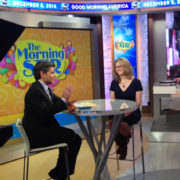Emma Thompson Calls Out Hollywood for Weight Pressure: Dr. Robyn Silverman on Good Morning America
We need people in the limelight to speak up about weight obsession, body image and eating disorders. Thankfully, more and more people have been stepping up. I was on Good Morning America this morning- talking about just that.
Most recently, Emma Thompson, award-winning actress, calls the weight pressures in Hollywood “evil.” She told the Swedish TV show, Skavlan, that:
“It is evil what is going on and happening out there, and it is getting worse…The anorexia… there are so many kids, girls, and boys now, and actresses who are very very thin that are into their 30’s and simply don’t eat. They don’t eat.”
Thompson also revealed that when she worked on the movie “Brideshead Revisited,” she heard one issue of dieting pressure that made her stand up for another fellow actress. She simply couldn’t keep quiet about it. I’m glad she didn’t.
“There was a wonderful actress I was working with and the producer said to her, ‘Will you lose some weight? She was absolutely exquisite. I said to them, ‘If you speak to her about this again, on any level, I will leave this picture, you are never to do that.'”
Any time a high profile person speaks up and says “we are more than our looks” and “this pressure to lose weight and be thin” is not okay, s/he does something very important for women and girls (and boys!) everywhere. She tells them, they are enough as they are.
It’s vital that we have conversations about these pressures and about the way media influences how people think about weight and size. I encourage parents to use what they see in the press as springboards for discussion- what do your children think about these pressures? What do they think about what Emma Thompson said? These conversations are not just important for girls and women but for boys and men too– it’ll take everyone to change these norms and unrealistic expectations.


 Two weeks ago, Dax Shepard opened up about being sexually abused as a child. Good Morning America came to my home to interview me for their story on the topic. The story didn’t air but I wanted to give all of you some of the questions they asked me (and my answers) as people have asked me about the segment.
Two weeks ago, Dax Shepard opened up about being sexually abused as a child. Good Morning America came to my home to interview me for their story on the topic. The story didn’t air but I wanted to give all of you some of the questions they asked me (and my answers) as people have asked me about the segment.


 James Harrison, football star on the Pittsburgh Steelers, is one tough linebacker. He also has drawn a hard line when it comes to parenting. On Instagram this past weekend, he reported that his 2 sons received “participation trophies” and that he was returning them.
James Harrison, football star on the Pittsburgh Steelers, is one tough linebacker. He also has drawn a hard line when it comes to parenting. On Instagram this past weekend, he reported that his 2 sons received “participation trophies” and that he was returning them.



 After my segment on Good Morning America, I ran into Taylor Swift in the elevator! What a fun, happy treat. I posted the selfie of us and you know what? I received the most likes I ever got. Ironic given the segment topic!
After my segment on Good Morning America, I ran into Taylor Swift in the elevator! What a fun, happy treat. I posted the selfie of us and you know what? I received the most likes I ever got. Ironic given the segment topic!
